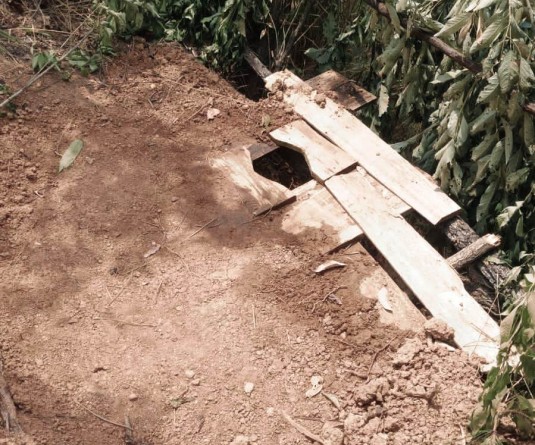Lack of rainfall has affected the germination of maize which is the main crop of the district. (Morung Photo)
.jpg)
P Achumse Yingbithongrü
Kiphire | June 16
Rural farmers in Kiphire already reeling under the impact of COVID-19 are now grappling with the vagaries of weather as well. With the majority of farmers living in rural area, farmers primarily depend on rainfall for harvest. However, due to lack of rainfall in the past two months, yield of important food crops like rice, maize, barley, Job’s tears and millets are set to go down drastically this year.
Farmers said that lack of moisture in the soil has severely impacted the germination of seeds as there is no rainfall at all as compared to past years.
District under Meteorological Drought
Speaking to The Morung Express, Senior Scientist and head of the Krishi Vigyan Kendra (KVK) Kiphire Dr N Khumdemo Ezung said that meterological data maintained by KVK Kiphire under DAMU project revealed that during the current year, from January to May 2021, Kiphire received very less rainfall as compared to last year during the same period.
Dr Ezung pointed out that the lack of rainfall has adversely affected the germination of the crops, particularly maize which is the main crop of the district during kharif season.
According to data, he said, during the month of April which is the peak sowing season in the hill ecosystem, the district received only 0.9 mm of rainfall on an average, resulting in less moisture, thereby severely affecting seed germination..jpg)
Crops which had already germinated gradually wilted due to high temperature during the day time coupled with high wind velocity which prompted higher evapo-transpiration, he added. He also pointed out that the weather events clearly indicate that the district is already under meteorological drought and has entered into the agricultural drought which will ultimately lead to hydrological and social-economic drought.
Vegetables and fruits production affected as well
Stating that less rainfall in the district has hit the farmers hard, Kiphire District Horticulture Officer (DHO) Senti Longchar informed that the department took up 7 villages as ‘vegetable village’ in the district under NEC program for post COVID-19 measures. However, due to the drought like situation in the district, it has been observed that there has been delay in vegetable seed germination.
This, he said, would drastically reduce vegetable production, which will severely affect the farmer’s income. He also added that the quality of fruits and its production is going to take a hit this current year due to drought-like situation prevailing in the district.
How farmers are coping
With majority of people living in rural areas and completely dependent on agriculture for their income, farmers are uncertain as to how to cope with the unprecedented situation.
Sharing the ordeal that many other farmers are facing Chumulongse said, “We had to sow maize and other crops thrice but as there is no rain it has still not germinated and crops have all wilted. This year if the situation goes on like this, we will not harvest anything. We are still waiting for rain as there is no facility for irrigation. If it doesn’t rain in a fortnight, crops will perish.”
Another farmer Avi said, “How are we going to carry on this year if we don’t harvest anything. We have put all our labour and energy hoping for a good harvest but looking at the crops, all our hard work has gone in vain.”
Role of Agri & Allied
As most of the crops have perished due to lack of rain, the role of Agri & Allied department becomes critical in providing scientific and technical know-how to farmers to handle whatever crops is left standing. One area where the departments can help is to provide tools and seeds to farmers to salvage the grim situation facing the district.
Speaking on condition of anonymity, some Agri officials revealed that Kiphire being predominantly agricultural society, there was huge demand for crops and seeds this year. However, the department was not able to meet the demand as whatever was sanctioned for Kiphire district from the higher authority was too miniscule to cover single area, let alone the entire district.
The officials also informed that Kiphire was not getting enough crops and seeds needed for the farmers as compared with the other districts..jpg)
Recommendation
Suggesting various measures to meet water requirements, Dr Ezung recommended introducing programmes for construction of water harvesting structures such as pond lining with 1000 micron sheets or provision of jalkund with 300gsm LDPE polyfilms so that water from the perennial source can be harvested for providing live saving irrigation to the crops wherever possible.
He said at times like this it is strongly recommended to immediately take up contingency measures such as provision of livestock as an alternative source of income to the affected farmers. Further he added that arrangement may also be made to provide strong input support to farmers for following winter season such as vegetables seeds so as to ensure income from rabi crops.
In such a situation it will do well for the authority concern to carry out verification and surveys to assist the damage and come up with the remedy to help farmers who feed the state.





